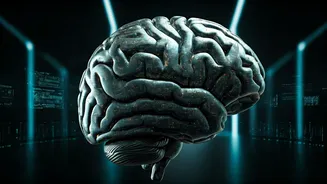Embrace Critical Thinking
In an era of easily accessible information, the ability to think critically is paramount. Critical thinking involves evaluating information, identifying
biases, and forming well-reasoned judgments. It's about questioning assumptions, analyzing evidence, and making informed decisions, which is something AI, while powerful, often struggles with. By honing your critical thinking skills, you can discern truth from falsehood, evaluate arguments, and approach problems with clarity. This is essential for navigating the complex information landscape and making sound judgments in a rapidly changing world.
Cultivate Creativity & Innovation
While AI can perform repetitive tasks, it lacks human creativity and innovative thinking. The ability to generate novel ideas, think outside the box, and develop innovative solutions will set you apart. This includes brainstorming, experimentation, and finding unconventional solutions to problems. Foster your creativity by engaging in activities that stimulate your imagination, such as art, writing, or simply exploring new ideas. In a world driven by innovation, creative thinking is a skill that will always be in demand, allowing you to generate new ideas and strategies that machines can't replicate.
Master Complex Problem Solving
Complex problem-solving involves breaking down intricate challenges into manageable parts, identifying root causes, and devising effective solutions. It goes beyond simply following instructions; it requires the ability to analyze multifaceted issues, consider different perspectives, and develop strategic approaches. This skill is critical for adapting to unexpected situations and tackling unforeseen obstacles that AI might not be equipped to handle. Improving your complex problem-solving abilities involves practice and exposure to diverse challenges.
Focus on Emotional Intelligence
Emotional intelligence, or EQ, involves understanding and managing your own emotions, as well as recognizing and responding to the emotions of others. This encompasses empathy, self-awareness, social skills, and the ability to build strong relationships. In a world of increasing automation, EQ becomes even more valuable. It is the foundation of effective communication, collaboration, and leadership. Developing emotional intelligence ensures effective communication, and fosters strong relationships, something that is difficult for AI to replicate.
Develop Adaptability and Agility
The future of work is characterized by rapid change and uncertainty. The ability to adapt to new situations, learn new skills quickly, and adjust to evolving circumstances is essential. This flexibility allows you to embrace new technologies, navigate changing roles, and thrive in an environment of continuous learning. Adaptability means being open to change, accepting new challenges, and being resilient in the face of setbacks. Cultivating this skill ensures you remain relevant and in demand, no matter how the work landscape changes.
Prioritize Lifelong Learning
The most crucial skill for navigating the future is a commitment to continuous learning. This means actively seeking new knowledge, updating your skills regularly, and being open to acquiring new expertise throughout your career. With technological advancements happening quickly, the ability to learn and adapt to new information is paramount. This includes exploring new fields, engaging in training programs, and seeking out mentors. By embracing lifelong learning, you can stay ahead of the curve, remain relevant in your field, and be ready for whatever the future holds.























